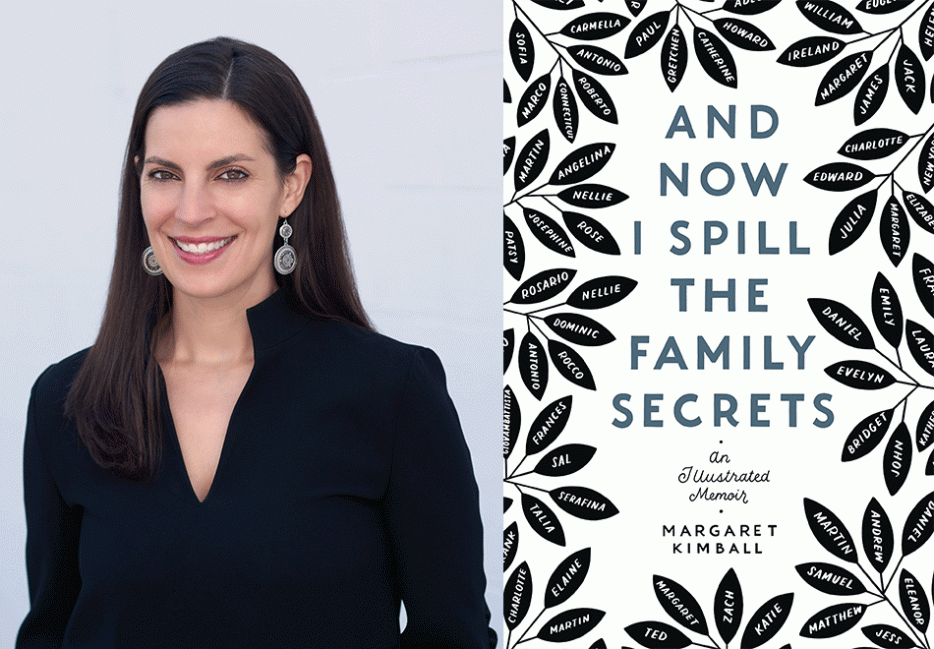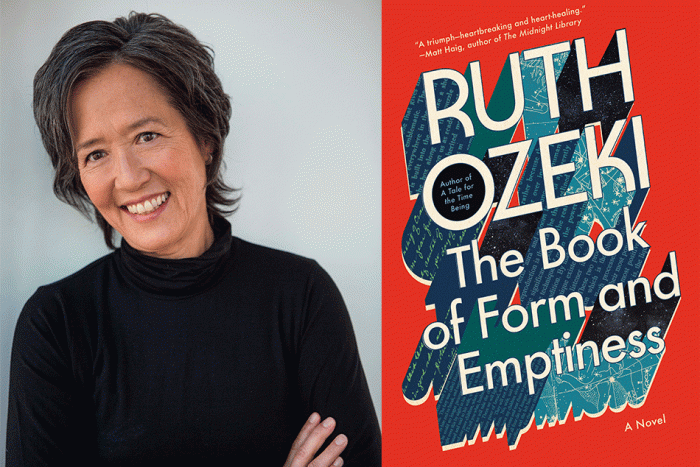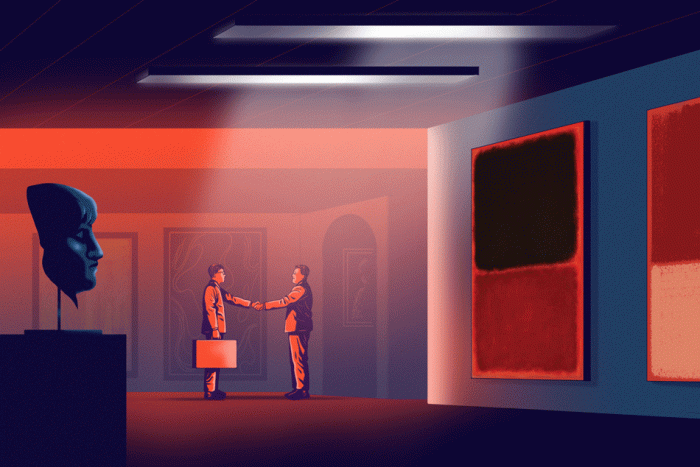On Mother’s Day in 1988, Margaret Kimball’s mother attempted suicide—a family secret that was only revealed to her 15 years later. In Kimball’s family, silence became the answer to a painful history of mental illness and death. But the unspeakable cannot remain unspoken—grief must eventually be brought to the surface. Through And Now I Spill the Family Secrets (HarperOne), Kimball’s debut illustrated memoir, she has found a way to break her family’s tradition of silence.
Can a family archive provide clues when our memories feel inadequate? As she examines photographs, hospital records, diary entries, and other family artefacts, Kimball searches for meaning. Her desire to find a reason for the tragedy in her family history is an instinctive impulse, the opposite of silence. If we can define a cause by putting language to the pain we’ve experienced, maybe we can protect ourselves and the people we love from further hurt.
Kimball’s pages are not typical panels of a graphic novel. She illustrates rooms from the houses she grew up in, objects from her childhood, and family records. The only time human figures appear are in her illustrations of photographs or home videos. Many of the pages show rooms in which people are absent, a choice she made to create an immersive, accessible experience, for the reader to put themselves in these spaces. When I was reading, I did exactly that—imagining my own childhood home, my parents’ divorce, and my family’s history of mental illness that has gone undiagnosed. Kimball has managed to process and work through her own trauma while constructing a narrative that will be familiar to readers who have known and struggled with silence in their own families, making And Now I Spill the Family Secrets a powerful achievement.
I spoke to Kimball about the inaccuracy of memory, her childhood home, and the process of healing that came from writing about her family’s traumatic past.
Sabrina Papas: A large part of the narrative of your family history is based on home videos. You refer to these home videos as “evidence,” a way to validate your own memories. The videos act as a form of time travel to access the past. Would you have been able to undertake the same journey without these videos?
Margaret Kimball: I think I would have still tried to unpack the family history, but I feel like the videos just offered evidence that I wouldn’t have been able to get otherwise. I saw us walking around and talking and interacting with each other. Especially the tension between my parents was so palpable, just watching it. From the position now, 30 years later as a married person, you can just see it and have a little more sense of what that might have meant inside of their marriage, to them. Whereas I never would have seen that and I would’ve questioned my memory more.
I feel like the videos just provided this layer of context that gave me a little more insight into their marriage that I don’t think I would have seen. And then I could extrapolate from that what that meant for our family dynamic, if they were having so much tension. So I think I would have done a book, but it would have been a little different.
Do you think our memories can be more accurate than family artefacts of videos, photographs, documents?
I think both are important. A memory, you can recall a feeling or a sense of the atmosphere or mood of an experience. Whereas the evidence itself is just cold hard facts, like this happened on this date or this is the document of this, or the marriage certificate. But I feel like you need both, cause memory is really terrible. Without my diaries, without all the documentation I found, the dates would have been totally confusing to me.
For instance, my concussion. I thought I was 8 years old when I had that concussion. And it was like, no I was four. And then learning that it happened in 1988, which was the big year for my family. It was surprising. I think having both documentation of things and remembering on your own are so important to push together and figure it out. One of the things I loved was, I would have my memory, and then I would find evidence that countered my memory, or added to it, or changed it in some way. So then I had to figure out like, okay well my timeline’s off, so how do I incorporate this? Or my brother’s memory is different from mine, so how do I incorporate both perspectives and try to make it fair to everybody? That was such an interesting problem to try to solve. But I felt like I just needed as much information as I could get to make an accurate story.
There are also certain documents that are irretrievable. I’m thinking specifically of when you try to find the files from your grandmother’s first admission into a mental health unit in 1959. The patient files, however, were all destroyed. At the time, ideas about mental health would have been limited, even harmful—especially for a woman. But would having access to these files have made a difference in understanding your grandmother’s experiences?
Oh, totally. It’s such a blank spot in my mind. Maybe she went, and it was therapeutic and fine. I wonder if she had a lobotomy or was given electroshock therapy over and over. I have no idea. I know what she was like when I knew her, but when I think of a 21-year-old, and even just having that experience of going to the hospital, you have an infant—is traumatizing. But I think there’s a whole other layer of it when there’s a physical trauma as well. I think it would really deepen my understanding of her life if I knew. They say they’re destroyed, but part of me wonders if the files exist secretly somewhere. But I can’t get them.
A memory will always be different for each person involved. Even home videos and photographs, that claim to objectively capture a moment, are subjective. When constructing your family history, did you find that there were multiple versions of events to interpret? How did you choose what to accept as truth?
All my family members have different memories of everything that happened. My baseline is if I had any physical evidence, like a diary entry, that was like “this person said this on this day” or just a video, or a photograph or something—I would use that as the concrete fact that was irrefutable. It’s like, “Well, I have evidence so, that’s that.” Then I just talked to each family member as much as I could about specific memories.
An example is my parent’s divorce, where my mom says my dad had an affair. I haven’t exactly talked to my dad about it, but he’s kind of hinted at it. But I had to kind of interpret my mom’s understanding of an affair, which is different from mine. I think maybe during the separation, my dad was dating somebody else. And so I feel like I tried to be fair to her memory, but also be fair to my dad and say “This is what I think happened.” So I guess I just try to show the different perspectives as much as I could, and then do my own interpretation.
It’s so hard cause everybody feels so strongly in their memories. I think as you remember something, it deepens that neuropath in your brain, so you’re so certain about it, but it might be totally wrong.
I was reading Bluets by Maggie Nelson yesterday. There’s a passage about memories, whether or not when you remember an experience, it’s a trace of the original experience or if we’re creating a new trace each time from recalling the memory.
It literally changes over time. Especially if your first memory is incorrect. That’s the interesting thing, you never know what’s exactly correct. Especially from a different angle, it looks different. I find that one of the most interesting things about memoir, and also the most frustrating things. Some days I’m like “What is the fact?” and there is no fact. It’s just a series of perspectives.
Did the process of compiling research for the book make you more aware of how you record and preserve your own experiences and thoughts?
When I was ten, when I found out that my mom was bipolar, I just stopped writing in my diaries for a year. I didn’t mention it, I didn’t say anything about it. I think in realizing that, I realized that sometimes I do that. I carried that through. If there’s something extreme happening in my life, I just stop writing about it. Which is probably the worst thing to do, cause I know I’ll write about it later, so really I should be documenting it. But I think sometimes it’s too overwhelming to jot things down in the middle of a storm. So that was surprising.
The other thing, there’s something about records and learning how many records exist—that was kind of glorious to me. There’s public records, and then as I was talking to my parents when they finally agreed to talk to me about the book, they had so many photographs and documents and videos that I didn’t even know about. It made me think about what we keep over time and what my parents are willing to shell out. I think at this point, they don’t care. They’re like “Whatever, take whatever you want, empty our house, please.” But I think just learning the vastness of the archive that we actually have as a family, in addition to what’s available, even just online from public records is really fascinating to me. So I just try to be more aware of that and keep more records. So now if I have medical stuff, I request the records right after. I’m like “I need those for something.” I try to do that with everything.
In a conversation with your mother, she expresses anger at the prospect of her life being written about. At the time, you disagree and tell her that you’re writing about yourself—a statement which you regret on later reflection. But when we write about the people we love, especially family, are we not also writing about ourselves? Is there a way that their stories become a part of us?
I think yes, I’m always writing about myself. But I [also] think it’s never true to say “Well, I’m not writing about you,” when I’m exactly like “My mom tried to kill herself on this day”—that had nothing to do with me. There’s just no excuse for what memoir does to the people in our lives. It’s very much taking other people’s experiences, at least in this case cause I’m writing about my whole family. It’s taking their experiences and using it for my own purposes.
In this case, I think it’s for honourable purposes. I was trying to process a lot of traumatic events that happened to us over time. Nevertheless, it’s still taking their experiences and writing about them. So I think, while I am writing about myself and trying to deal with it, interpret it, process, and heal, no matter what it’s still taking their lives. And some of the darkest times in my parent’s lives in particular, and my maybe my older brother too, I’m not totally sure. And just kind of exploiting them in a way. So that’s something I’ll probably always feel guilty about. But I still just feel like it’s such an important thing to do to, to not have secrets and not feel shame, that I’m still going to do it.
No matter what, it’s still connected to you and who you are.
I think it helps the family too. They process things differently. They don’t write books about it, for instance. But I think once one of us starts yacking about it non-stop, it kind of gives license to everybody to talk about it. Maybe even laugh about some of the things in a way. Or just let the memories exist, rather than have them buried as secrets.
I’m interested in the absence of human figures in your illustrations. Many of the panels depict empty rooms, or objects from your childhood. The only time people appear is in illustrations of home videos or family photographs, but never in undocumented memories. Can you speak about this choice?
It started out just intuitively. I was drawing rooms and not people in the very early drafts of the book. But as I tried to consider which approach to take, I felt I don’t remember people when I think of my memories, I remember very much place. Or flashes of things, flashes of a shirt, or shoes. But I don’t picture people in my memory so much as place. Place is a really strong aspect of memory for me. I wanted readers to be able to be fully immersed in the environments that I was immersed in. When I think of these memories, this is what I think about. So I just didn’t draw people.
But I didn’t want it to be lifeless. So when I had photographs or something that felt more concrete to me, like “Okay, if I document this photograph, it’s real,” versus me just interpreting what I might have looked like at age six. So it was this idea of creating the environments readers could immerse themselves in.
I think it would have changed the whole feel of the book if I had drawn us growing up throughout. I think it would have made it less accessible in a way, because I want the reader to put themselves in the space. If you’re just looking at people in the space, maybe you’re not in it as much. It could just be an excuse because drawing people is hard, I don’t know. But it felt to me like the most strong things in my memories are of place, not people.
There’s also a feeling of the places being preserved through the drawings.
The memories are so dear to me, I love them. The house we grew up in, I’m always looking it up online to see if it’s for sale. Which it’s not. Not that I want to buy it, but I just want to look in the rooms. I’m so in love with some of the memories or some of the places. I think you’re right, I just wanted to show people my bedroom or our yard—I just love them. They’re so big in my mind. I guess just to let people in on that.
You write about returning to your childhood home. Your mother also visited many times and spoke to the people living there. What do you think draws us back to old homes? What are we looking for when we return?
I was so young at the time. I think if I went back now, it would be trying to see it and remember it and feel the feelings of that house. Which you can never do cause it’s probably totally different. But I also think when there’s something unresolved, you might return to a place and try, even if it’s just subconscious, [to] interpret your memory of the place, or what happened there, or live in those feelings again. I do feel like it’s a way of processing, to return to a place. Especially if you haven’t been there in a long time. To just go back and see what’s the same, see what’s different, if any of it correlates to your memory. I think it’s just a way of processing something that’s happened.
I’m working on another book now which takes place when I was in grad school. I keep imagining myself going back to Tucson to visit, cause I haven’t been back since then. I keep wondering what it’s going to be like, and am I going to remember the streets? One of the amazing things about going back to Glastonbury, where I grew up, is I remember my bus route. I can just drive along and I was like “Laura lived there, and Chad lived there.” It’s so weird, you see these things and it’s kind of magical to feel that, to feel that memory come alive. Like “I remember riding the bus on this street, I can find my way home.” So I think it’s just a way of processing. It gives me warm feelings to see something that you lived a long time ago that’s no longer a part of your life.
It’s almost like entering a memory in a way because these places that we inhabited when we were younger, they feel like they don’t exist—it almost feels like they’re not real. So when you visit, and you’re reminded of it, it’s like you’re in a film and entering these sets of your life.
Yeah! It’s connected to the evidence thing. I feel like so many of my memories, I sort of dismissed. I mean, I can name ten of them. I thought, maybe I imagined them, or maybe it was a dream, especially when you’re younger. Like my dad carrying my mom down the steps [after she attempted suicide]. It’s like, maybe that was a dream. Until it was confirmed by my brother, and then my parents, I was like “Oh, I just thought that was some weird image I had in my head that I invented.”
It’s the same thing with places. It does feel like a confirmation of your experience, which is a great feeling I think.
Silence became a way for your family to avoid confronting a difficult past. You write about your own habit of a “failure to record in the heart of catastrophe.” What inspired you to overcome the silence and put language to your family’s unspeakable past through a memoir?
A few things. One is, I just hated the secrets. I still do. But I hated when, if I asked my dad or my mom about something and they just wouldn’t talk about it. Or they would give me completely different stories, or the story changed every time. I just hated that. I sensed their shame. I feel like secrets are [a] means of hiding shame. I sensed their shame about the past.
My mom was so ashamed of the suicide attempt in 1988, she still is. My dad is so ashamed of the divorce and what happened. I just wanted to put language to it so we could deal with it, so that it doesn’t have such a big presence in our lives. I think with secrets like that, that impacted our whole lives. It just impacts everything, there’s this ripple effect. If there’s this thing that’s happening and no one’s talking about it, it creates this panic of “Is this really happening, am I okay? Is everybody okay? Is everybody not okay?” And there are just all these questions that arise when no one’s talking about what’s clearly happening, or what clearly has happened.
So I feel like I just rejected that. I don’t know if it’s a personality disorder, but I’ve always been like “I want to talk very clearly about what’s happening, what’s happened, what’s going to happen,” so that it makes sense to me.
You explain that grief in your family, in relation to mental health, “has been passed on and reshaped through generations, each person containing two sorrows—one for herself and one for others.” Have you found a way to take care of yourself and your own grief through the process of writing the book?
The book was really surprising. I was so angry for so long at my mom. And then later at my dad, it took me a really long time to ever be angry at my dad, but I was. But in the process of writing, and trying to ask them questions, which I hadn’t done in early drafts, in part because they refused to talk to me about it. But in talking to them about it, I just felt a ton of empathy for their positions. They were in impossible situations I think. They had good intentions the whole way. I think everybody does the best they can. They certainly did. It just wasn’t great all the time. It feels mean to say I forgave them, because I don’t feel like I had to forgive them anything. But my anger dissipated, and I just felt sorry for them.
I think writing the book was such a healing process. It helped our relationships, because all the secrets were out. Unless there are more I don’t know about, which is totally possible. I’m sure there are more I don’t know about. But the ones I cared about are all out in the open now, it’s all fine. I don’t feel any anger towards them anymore and I don’t think they feel anger towards me—I think—for writing a book. I hope not.






